Believe Bundle
How Did Believe Company Disrupt the Music Industry?
In an industry constantly reshaped by digital innovation, Believe has carved a significant niche. Founded in 2005, this digital music company set out to empower independent artists and labels. Its journey from a startup to a global leader offers a compelling case study in adaptability and strategic growth within the digital music industry.
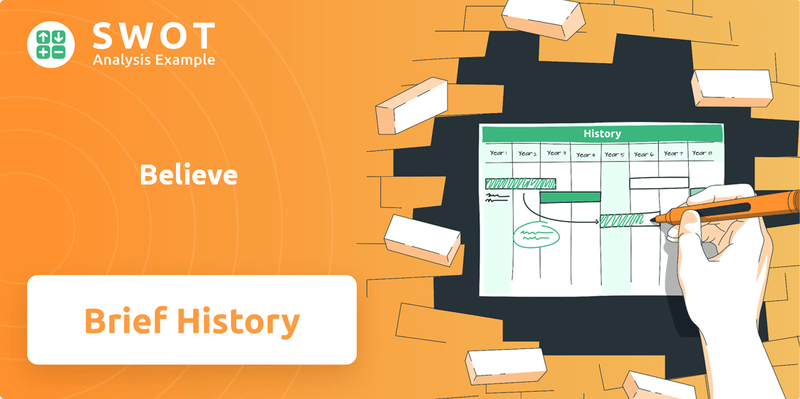
Believe's story is one of remarkable transformation, from its early days focusing on Believe SWOT Analysis to its current status as a major player in music distribution. The company's success is a testament to its understanding of the evolving digital music landscape. Exploring the brief history of Believe Company reveals how it capitalized on the shift towards digital consumption, providing crucial music distribution services and support for independent music creators worldwide.
What is the Believe Founding Story?
The story of the Believe Company began in Paris, France, on April 7, 2005. The company was founded by Denis Ladegaillerie, Arnaud Chiaramonti, and Nicolas Laclias. Denis Ladegaillerie, who previously worked at Vivendi, took on the role of CEO.
The founders saw a chance to help independent artists and labels navigate the shift to digital music. They aimed to provide tools and services that would help these artists distribute their music online, moving away from the traditional physical sales model. Their goal was to support independent artists and labels in the digital world, offering solutions to help them grow their audience.
Believe's early business model focused on digital distribution, allowing artists to sell their music on platforms like iTunes. A key early success was signing MC Solaar in 2008. The company's growth was supported by a $60 million investment from Ventech, Technology Crossover Ventures (TCV), and XAnge, which was crucial for their international expansion.
Believe was founded in 2005 with a focus on digital music distribution. They aimed to support independent artists and labels in the digital space.
- Founded on April 7, 2005, in Paris, France.
- Key founders: Denis Ladegaillerie (CEO), Arnaud Chiaramonti, and Nicolas Laclias.
- Early focus on digital distribution for independent artists.
- Signed MC Solaar in 2008, a notable early achievement.
- Secured $60 million in growth capital for international expansion.
The Revenue Streams & Business Model of Believe highlights how Believe has evolved from its early days. Believe's initial strategy was a response to the growing need for digital music distribution services. The company quickly became a significant player in the independent music sector. This early focus helped Believe establish itself in the digital music industry. The company's ability to adapt to the changing landscape has been a key factor in its growth.
Believe's early years were marked by a clear vision to revolutionize music distribution. The company's founders identified a gap in the market and developed a strategy to support independent artists. Believe's commitment to innovation and artist services has been consistent throughout its history. The company's early achievements set the stage for its future expansion and success.
Believe SWOT Analysis
- Complete SWOT Breakdown
- Fully Customizable
- Editable in Excel & Word
- Professional Formatting
- Investor-Ready Format
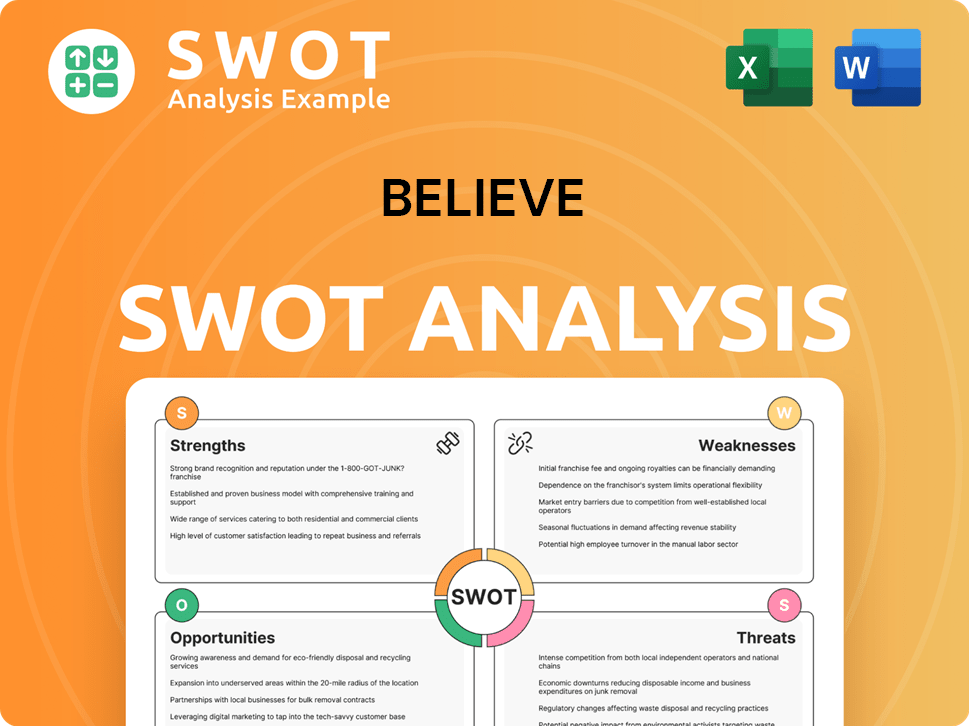
What Drove the Early Growth of Believe?
The early growth of the Believe Company history was marked by strategic investments and a focus on expanding digital distribution capabilities. This period saw significant acquisitions and expansions into new markets, solidifying its position in the digital music industry. The company's financial performance reflected this growth, with substantial increases in revenue and market share.
A key milestone was the full acquisition of TuneCore in 2015, boosting Believe's 'Automated Solutions' segment. This segment generated €64.6 million in 2024, growing by 15.9% year-over-year. Further expansion was fueled by a $60 million growth capital investment from Ventech, TCV, and XAnge, facilitating international reach, which helped Believe music distribution.
Believe demonstrated consistent growth, with revenues increasing by €135.8 million (30.7% year-over-year) from €441.4 million in 2020 to €760 million in 2022. By 2024, total revenue reached €988.8 million ($1.070 billion USD), an increase of 12.3% from 2023, with organic growth at 11.5%.
Growth was particularly strong in Europe (excluding France and Germany), with a 23.3% increase, and in the Americas, with an 18% rise. Believe expanded its presence in key emerging markets, notably Russia and India. In India, Believe India has become a leading player since 2013, with offices in seven regions and 171 employees.
The company focused on digital-friendly music genres, launching labels like b.electronic and All Night Long in 2023. In 2024, Believe acquired a 25% stake in Global Records, accelerating growth in dance music. The company's expansion strategy also included a focus on catalog acquisitions, with a €91 million M&A cash out in 2024.
Believe was taken majority-private again in June 2024 by investors including TCV, EQT, and founder Denis Ladegaillerie, with the consortium holding 96.63% of Believe's share capital as of March 2025. This strategic shift aimed to accelerate growth, with plans to spend €200 to €300 million per year on acquisitions.
Believe PESTLE Analysis
- Covers All 6 PESTLE Categories
- No Research Needed – Save Hours of Work
- Built by Experts, Trusted by Consultants
- Instant Download, Ready to Use
- 100% Editable, Fully Customizable
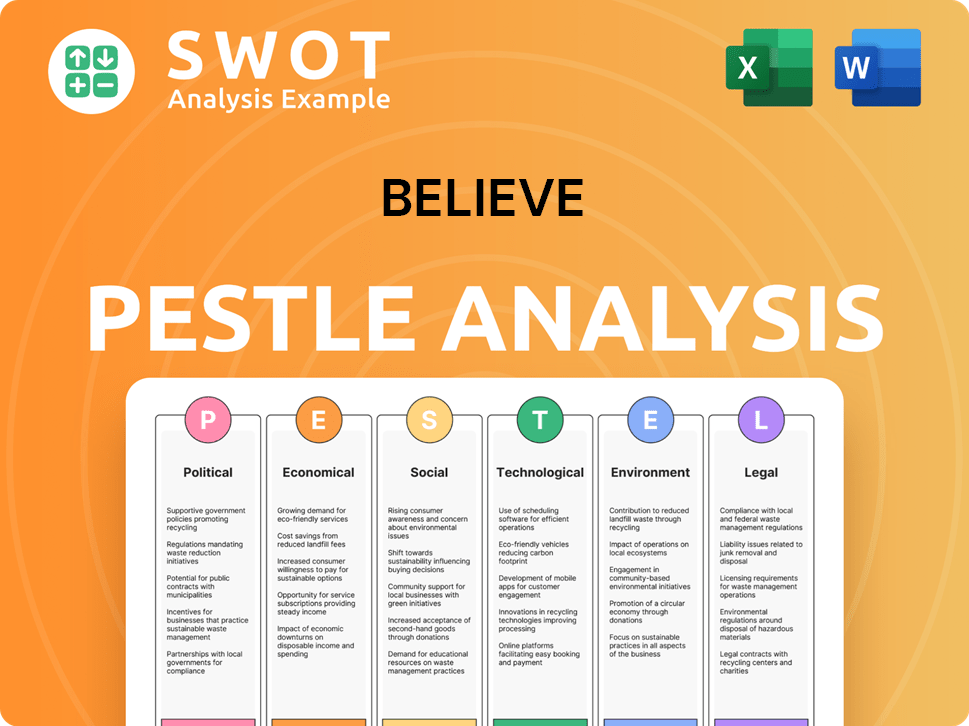
What are the key Milestones in Believe history?
The Believe Company history is marked by significant milestones, including strategic acquisitions and expansions within the digital music industry. These moves have solidified its position in the music distribution services market and its support for independent music.
| Year | Milestone |
|---|---|
| 2015 | Acquisition of TuneCore, expanding Believe's reach in the independent artist sector. |
| 2015 | Acquisition of Musicast. |
| 2016 | Acquisition of Naive Records for €10 million, leveraging its back catalog. |
| March 2023 | Acquisition of Sentric Music for $51 million, entering the digital-first music publishing business. |
| 2024 | Acquisition of Turkish label DMC, Punjabi label White Hill Music, and a 25% stake in Global Records. |
Innovation has been a key driver for Believe, with investments in technology and AI-driven analytics to enhance its music distribution services. The company has been an early adopter of new platforms, including deals with TikTok and YouTube Shorts.
Believe invests heavily in AI to improve its services, creating tools to help artists with audience engagement and marketing strategies. The company plans to spend €15 million on AI Music Promotion by 2024.
Believe launched the 'Be Odyssey' program to optimize its Central Platform's technological capabilities. This program aims to provide artists with advanced tools for audience engagement and marketing.
Believe is committed to enhancing its data analytics capabilities. The company plans to invest €10 million in Data Analytics Tools by 2025 to provide more insights to artists.
Despite its successes, Believe has faced challenges, including adapting to the digital music industry's evolution and dealing with market headwinds. In 2024, the company reported a negative EBIT of €2.1 million, but maintained a positive free cash flow driven by profitability increases.
Believe experienced persistent foreign exchange headwinds, which impacted its financial performance. These challenges particularly affected some emerging markets, such as those in Asia.
The company faced subdued ad-funded streaming in certain markets, adding to its operational challenges. This was especially noticeable in some emerging markets.
In 2024, Believe reported a negative EBIT of €2.1 million, primarily due to costs associated with the offer initiated by a consortium. Despite this, the company has managed to maintain a positive free cash flow.
Believe Business Model Canvas
- Complete 9-Block Business Model Canvas
- Effortlessly Communicate Your Business Strategy
- Investor-Ready BMC Format
- 100% Editable and Customizable
- Clear and Structured Layout
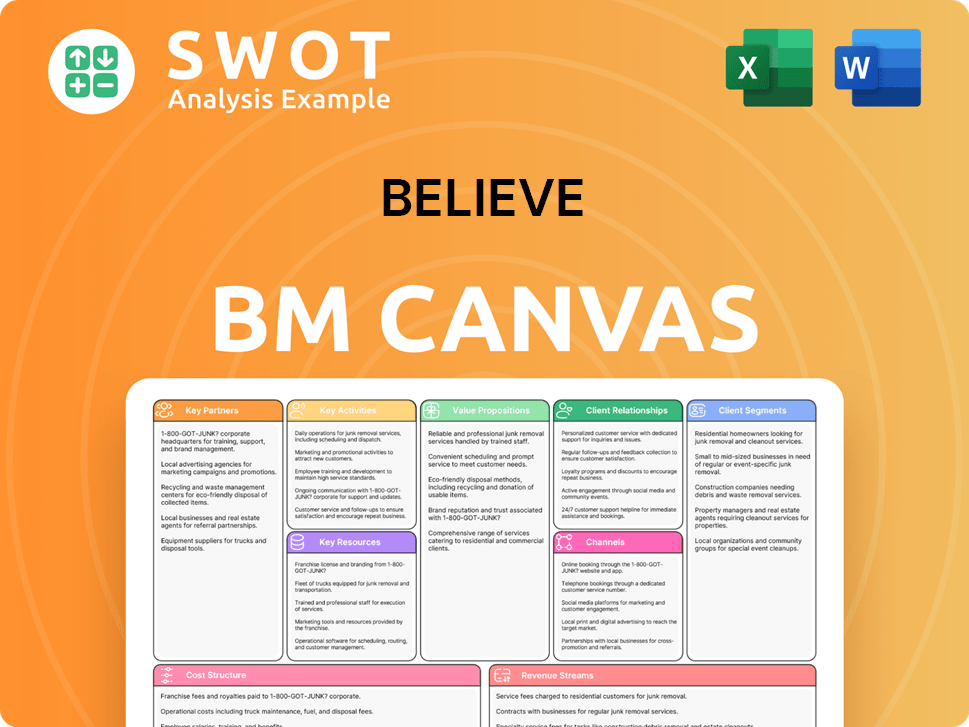
What is the Timeline of Key Events for Believe?
The journey of the Believe Company's history is marked by consistent growth and strategic adaptation within the dynamic digital music industry. Founded in 2005, the company quickly evolved from a digital distribution startup to a global player, expanding its services and presence through strategic acquisitions and partnerships. The company's evolution highlights its ability to adapt and thrive in the ever-changing landscape of music distribution services and independent music.
| Year | Key Event |
|---|---|
| 2005 | Founded in Paris by Denis Ladegaillerie, Arnaud Chiaramonti, and Nicolas Laclias, with a vision to support independent artists and labels in digital distribution. |
| 2008 | Signed MC Solaar for digital distribution, expanding its roster of artists. |
| 2010s | Secured a $60 million growth capital investment from Ventech, TCV, and XAnge to fuel international expansion. |
| 2015 | Fully acquired TuneCore, significantly expanding its independent artist services. |
| 2016 | Acquired French independent label Naive Records for €10 million. |
| 2019 | Expanded presence in Russia and India, acquiring Entco (renamed Believe Entertainment) in Mumbai and Venus (renamed Ishtar in 2021). |
| June 2021 | Went public on the Euronext Paris stock exchange, raising €300 million in its IPO. |
| November 2021 | Acquired a 76% stake in South India-based label Think Music. |
| March 2023 | Acquired British music publisher Sentric Music for $51 million, entering the digital music publishing business. |
| 2023 | Exceeded €1 billion in digital music sales (DMS). Launched two global dance/electronic music labels, b.electronic and All Night Long. |
| June 2024 | Taken majority-private again by a consortium including TCV, EQT, and Denis Ladegaillerie, with the consortium holding 96.63% of Believe's share capital. |
| July 2024 | Signed a strategic partnership with Global Records, acquiring a 25% stake. |
| 2024 (FY) | Generated revenues of €988.8 million ($1.070 billion USD), reflecting 11.5% organic growth. Achieved over 800 billion streams globally. Completed the acquisition of Turkish label DMC and Punjabi “powerhouse” White Hill Music. Launched its 'Be Odyssey' program. |
| February 2025 | Believe Thailand launches BEEEF, a new artist services unit focused on breaking indie-pop acts in the market. |
| March 2025 | Believe publishes its financial results for FY 2024. Believe and TuneCore partner with the Annenberg Inclusion Initiative to produce the second Inclusion in the Music Business report. |
Believe forecasts organic growth above +13.0% year-over-year for FY 2025. The company is aiming for an adjusted EBITDA margin of around 8%, with a long-term profitability objective of 15% adjusted EBITDA margin. This demonstrates a focus on sustainable financial performance.
The company plans to increase its focus on value optimization and accelerate controlled investments. It will implement more aggressive automation and efficiency plans to streamline operations. External growth will continue through bolt-on acquisitions and strategic advances.
Denis Ladegaillerie plans to spend €200 to €300 million per year on acquisitions and is considering a transformative acquisition in the next 12-24 months. Believe targets a market share of 15% in Asia and 10% in Latin America by 2026, indicating an aggressive expansion strategy.
Believe aims to achieve carbon neutrality by 2030 and increase women in leadership positions to 50% by 2025. These goals reflect a commitment to environmental and social responsibility, aligning with broader industry trends.
Believe Porter's Five Forces Analysis
- Covers All 5 Competitive Forces in Detail
- Structured for Consultants, Students, and Founders
- 100% Editable in Microsoft Word & Excel
- Instant Digital Download – Use Immediately
- Compatible with Mac & PC – Fully Unlocked
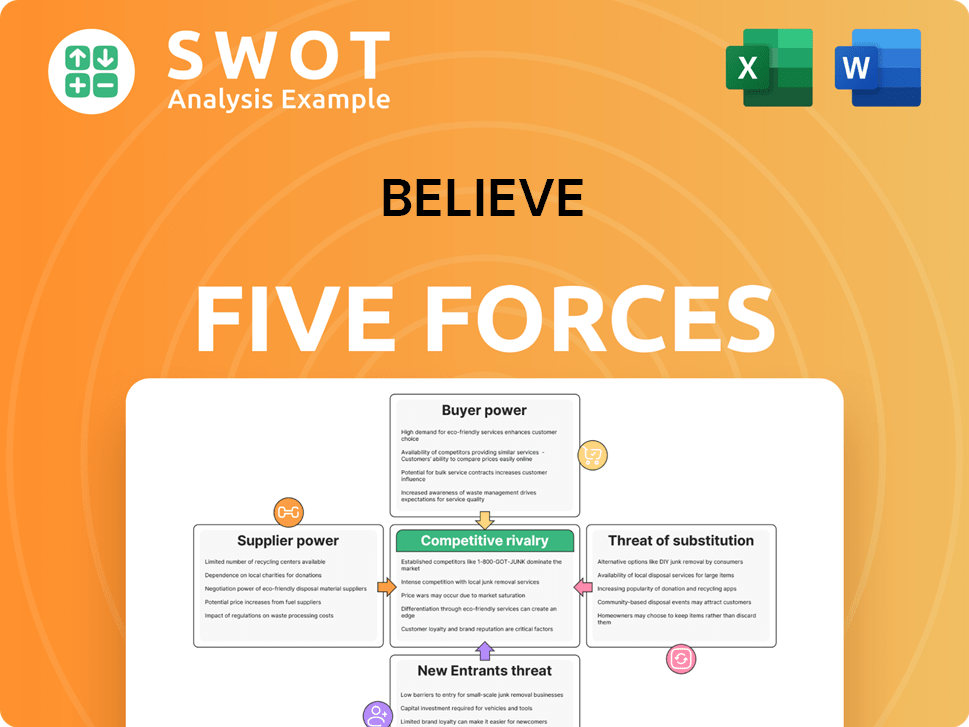
Related Blogs
- What is Competitive Landscape of Believe Company?
- What is Growth Strategy and Future Prospects of Believe Company?
- How Does Believe Company Work?
- What is Sales and Marketing Strategy of Believe Company?
- What is Brief History of Believe Company?
- Who Owns Believe Company?
- What is Customer Demographics and Target Market of Believe Company?
Disclaimer
All information, articles, and product details provided on this website are for general informational and educational purposes only. We do not claim any ownership over, nor do we intend to infringe upon, any trademarks, copyrights, logos, brand names, or other intellectual property mentioned or depicted on this site. Such intellectual property remains the property of its respective owners, and any references here are made solely for identification or informational purposes, without implying any affiliation, endorsement, or partnership.
We make no representations or warranties, express or implied, regarding the accuracy, completeness, or suitability of any content or products presented. Nothing on this website should be construed as legal, tax, investment, financial, medical, or other professional advice. In addition, no part of this site—including articles or product references—constitutes a solicitation, recommendation, endorsement, advertisement, or offer to buy or sell any securities, franchises, or other financial instruments, particularly in jurisdictions where such activity would be unlawful.
All content is of a general nature and may not address the specific circumstances of any individual or entity. It is not a substitute for professional advice or services. Any actions you take based on the information provided here are strictly at your own risk. You accept full responsibility for any decisions or outcomes arising from your use of this website and agree to release us from any liability in connection with your use of, or reliance upon, the content or products found herein.